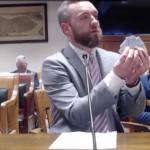
Testimony from the Cannabis Control Commission’s public hearing on outdoor cultivation
Two things can be simultaneously true. For example, Cannabis Control Commission members, what’s left of them, might squabble and underperform on some fronts, but sometimes they’re also nose-deep in other critical tasks. Bandwidth is a serious issue at the growing agency, and progress comes slowly in state bureaucracy—but in a recent demonstration of actual CCC momentum, last week commissioners hosted a listening session “regarding outdoor cultivation.”
Held at the Mason Public Library in Great Barrington, the forum attracted cultivators, business owners, watchdogs, and others who came to bolster the industry. Erik Williams of Canna Provisions said he attended to support outdoor growers, and touched on what he described as “oversupply” in the market. Others addressed topics like the lack of a checklist for licensees facing inspections telling them how to prepare, but most of the testimonies focused on the immediate topic in play—outdoor cultivations, and the challenges and difficulties those in this small corner of the industry are facing.
We couldn’t make it to the Berkshires; and even if we did, the conversation that unfolded—specifically regarding microbial testing standards—is best left in the hands of an expert. Someone like Megan Dobro, the founder and CEO of SafeTiva Labs in Westfield, who provided detailed testimony and fielded questions from commissioners. We recommend that stakeholders who missed the live show take the time to watch what Dobro and others had to say in full. For an excellent summary, read her highlights from the presentation below. -TJM Editors

-The microbial testing program needs an overhaul. It’s not working to keep consumers safe, and in fact, it’s making consumers less safe.
-We need to remove the Total Aerobic Bacteria (TAB) and Total Yeast and Mold (TYM) categories and instead focus on pathogenic species. TAB includes almost all bacteria in our environment, and limiting them penalizes farmers who are using sustainable practices. A large majority are harmless, some are even beneficial. They are natural pesticides that help to fend off more harmful species.
-Labs have no guidance about which species should be included. One lab could test for 40 species and another could test for 4. Quite often, a sample fails miserably on one testing platform and easily passes on another. It doesn’t necessarily mean there’s lab fraud or incompetence, it’s a symptom of vague regulations and lagging technology.
-The TAB and TYM categories have the widest variability across technologies, so these are the categories causing lab shopping for passing test results.
-These tests only measure a snapshot in time. Microbes continue to grow on flower for the year that those results are valid for. We shouldn’t be surprised when the microbial levels are much higher on off-the-shelf tests compared to the original compliance test.
-There are no studies that show cannabis consumers get sick if they consume 10,001 CFU/g or higher of yeast and mold. It’s not the number of microbes that make people sick when talking about combusted, inhaled material. Otherwise, every hippie smoking dank basement weed for decades would have gotten sick.
-The industry is suffering and every company is doing what it can to survive. That’s resulting in less safe product being sold to consumers. There are too many loopholes and not enough oversight on the testing sampling process to ensure consumers that the tests are representative of the retail batch. Enumeration tests give consumers a false sense of safety.
-Removing TAB and TYM would decrease lab shopping, reduce remediation, reduce tampering with lab samples, and boost employee morale, all without jeopardizing public health *as long as we add specific pathogenic strains like Aspergillus.*
-There is robust cannabis research happening and scientists will be more productive when federal restrictions are lifted. As we learn more about cannabis microbiology and human health impacts for different delivery methods, we need to be nimble enough to make changes when we have new information. The testing program was set up to be broadly strict, and now we know more from watching other states, so it’s time to adapt. Focusing on species is good for both producers and consumers.
























